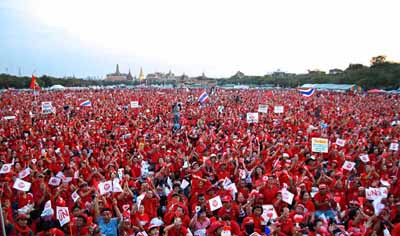Setting the Record Straight
Many Thais spoke out against foreign experts’ portrayal of the political crisis in their country. When will Burmese be able to do the same?
For some observers, the crackdown on Redshirt protesters in Bangkok on May 19 invited comparisons to similar events in Burma, where the ruling regime has repeatedly resorted to military force to suppress anti-government demonstrations.
Although there are indeed similarities—notably, the use of violence as a means of asserting the authority of the state in the face of a perceived threat to stability—there are also many differences.
 |
Another contrast is that Burmese calls for democracy have never been part of a political vendetta. In Thailand, on the other hand, the recent political unrest had as much to do with clashes within the ruling class as it did with the demands of ordinary people.
But perhaps the most striking difference is the way Thais have responded to the attention that their internal troubles have attracted in the rest of the world.
While Burmese often complain among themselves about the way some foreign “experts” portray the situation in their country but rarely express their views publicly, many Thais were outspoken when they detected signs of what they saw as bias on the part of international observers.
In one widely circulated critique of CNN’s coverage of the conflict in Bangkok, for instance, lawyer Napas Na Pombejra accused the network’s correspondents of slanting their reporting in favor of the Redshirts. In her open letter to CNN, she wrote:
“The magnitude of harm or potential extent of damage that erroneous and fallacious news reporting can cause to (and exacerbate), not only a country’s internal state of affairs, economic well-being, and general international perception, but also the real lives and livelihood of the innocent and voiceless people of that nation, is enormous.”
Nor was it just the media that came under fire for supposedly lacking a proper understanding of the Thai situation.
Just before the army crackdown in Bangkok, Thai Foreign Minister Kasit Piromya urged foreign diplomats not to meet Redshirt leaders or interfere in Thai domestic affairs. He also accused some ambassadors of voicing opposition to Thailand’s constitutional monarchy and criticizing the government’s handling of the crisis.
Whether or not one agrees with the specific criticisms leveled against the international media and members of the diplomatic community, it is difficult not to admire the quick and effective response of some Thais to what they saw as foreign meddling.
In Burma, by contrast, the state-run media, which acts as a mouthpiece of the ruling junta, is hopeless at making a convincing case for the regime’s actions. To be fair, however, this is mostly because the official version of events is usually so completely at odds with reality that not even the world’s most sophisticated PR operation could put a positive spin on, say, the generals’ decision to gun down unarmed monks or leave thousands to die in the wake of a massive cyclone.
But what about other Burmese—especially those in exile, who are not subject to draconian censorship? Are we any better at getting our message across when we believe that others have got the story wrong?
Sadly, our record on standing up to misrepresentations peddled by self-appointed “authorities” on Burmese affairs is mixed, at best. The reasons for this are complex and reveal a great deal about the powerlessness of the Burmese people not only in their own country, but also in the world at large.
Perhaps the key reason that Burmese exiles are reluctant to openly state their objections to views expressed by foreigners is that they know they need as many allies as they can find in their struggle to overcome military rule.
But while they may be wary of alienating their foreign friends by pointing out the errors in their sometimes simplistic assessments of Burma’s problems, they sometimes feel exasperated by the fact that ill-informed Western policy makers and powerful aid agencies often seem to have more say in Burmese affairs than they do.
1 | 2 next page »
|
||
|
||
|
||
|
||
|
||
|
||
